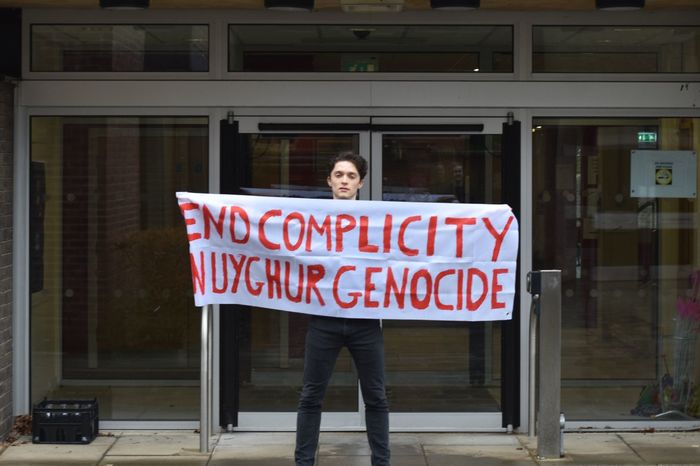Cambridge University at risk of ‘teaching torturers,’ report reveals
The University of Cambridge has provided police training courses in Hong Kong and India

The University of Cambridge has been named as one of 12 UK universities that has been involved in teaching security courses to students in countries where torture is widespread.
According to a report by Freedom from Torture (FFT), the University has provided programmes to police colleges in Hong Kong and India.
The University provided postgraduate education for Hong Kong Police College (HKPC), which was at the same time allegedly involved in teaching cooperation and exchange with the People’s Public Security University of China (PPSUC).
The PPSUC is responsible for training and supplying police for Xinjiang, where human rights violations including torture have allegedly been carried out on a scale amounting to crimes against humanity.
A series of police files obtained by the BBC in 2022 revealed details of China’s use of “re-education camps,” detaining what human rights groups believe to be more than one million Uyghurs against their will. The files described the routine use of armed officers and the existence of a shoot-to-kill policy if someone was to escape.
China has also been accused of persecuting Muslim religious figures and forbidding religious practices in the territory, in addition to destroying mosques and tombs.
Between 2017 and 2020, Cambridge, in partnership with HKPC, offered a Master of Studies (MSt) in “Applied Criminology and Police Management (Police Executive Programme)”. The course was designed for senior leaders of the police force and was available to three successive cohorts of Hong Konger students.
Lecturers from the University flew to Hong Kong and students from Hong Kong attended lectures in Cambridge as part of the programme. The HKPC described the programme as designed to help develop “future leaders in the Force”.
Cambridge’s partnership with HKPC coincided with an increase in human rights violations in the region. During this time HKPC had direct contact with Xinjiang’s police force and Xinjiang Police College which was later sanctioned by the USA in 2019 for its role in “egregious human rights violations in the region”. The course is still being offered by the University, although the contract with HKPC was terminated after China began its crackdown on free expression in Hong Kong.
In 2019, anti-government protests erupted in Hong Kong after an extradition bill was introduced that would have allowed for criminal suspects to be extradited to mainland China. Although the bill was withdrawn later that year, Hong Kong’s national security law was introduced in 2020. The law made illegal a wider range of government dissenting acts, including secession which is the breaking away from China, and subversion: undermining the authority of central government.
Police violence occurred during the Hong Kong protests with police officers seen beating, pepper-spraying and teargassing people, including those already subdued on the ground. No members of the police force alleged to have used extreme force during the 2019 protests have been held accountable according to Human Rights Watch.
The Institute of Criminology at Cambridge University stated: “The Institute of Criminology does not work with the Hong Kong Police. The Institute taught three cohorts of Hong Kong Officers from 2017 as part of a contract with Hong Kong Police.”
“As soon as the Chinese Government stepped in to restrict democratic freedoms we acted quickly and terminated the contract. Democratic values are a critical part of the Applied Criminology and Police Management programme,” they continued.
In 2021, the UK foreign secretary Dominic Raab outlined guidance to avoid the complicity of British organisations in human rights violations. The guidance stated that “businesses that directly or indirectly provide goods and services to authorities in Xinjiang… are at risk of unintentionally facilitating or being otherwise complicit in human rights violations”. In light of this advice, FFT have said Cambridge’s relationship with HKPC “raises clear concerns”.
According to freedom of information requests received by FFT, Cambridge University did not conduct any checks on their partnerships with HKPC or PPSUC to spot and evaluate risks to human rights.
The University of Cambridge has also been criticised for its link with a police academy in India.
Cambridge Enterprise, a subsidiary of the University, has provided mid-career training for senior police officials at India’s national Sardar Vallabhbhai Patel Police Academy.
The relationship began in 2010 when Cambridge’s Institute of Criminology signed a contract worth £2.4 million with India’s National Police Academy. The agreement involved Cambridge providing mid-career training for 420 police officers for a period of three years, but has been extended to at least 2020 when the University agreed to a two-year programme to train 600 police chiefs in India.
Want to share your thoughts on this article? Send us a letter to letters@varsity.co.uk or by using this form.
 Comment / Cambridge’s tourism risks commodifying students18 April 2025
Comment / Cambridge’s tourism risks commodifying students18 April 2025 News / Cambridge student numbers fall amid nationwide decline14 April 2025
News / Cambridge student numbers fall amid nationwide decline14 April 2025 News / Greenwich House occupiers miss deadline to respond to University legal action15 April 2025
News / Greenwich House occupiers miss deadline to respond to University legal action15 April 2025 Comment / The Cambridge workload prioritises quantity over quality 16 April 2025
Comment / The Cambridge workload prioritises quantity over quality 16 April 2025 News / Varsity ChatGPT survey17 April 2025
News / Varsity ChatGPT survey17 April 2025





